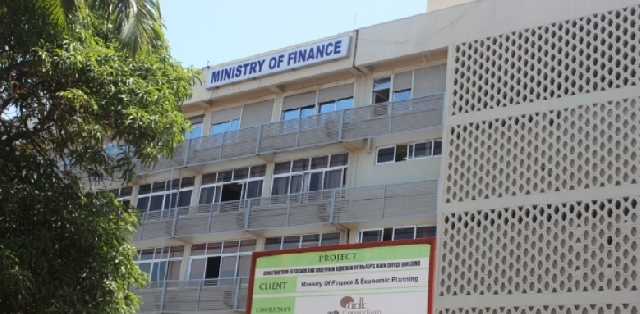Anti-LGBTQI bill inimical to financial support from Bretton Woods Institute
 Finance Ministry, Ghana
Finance Ministry, Ghana
Assenting to the anti-LGBTQI bill will affect Ghana’s benefits from the Bretton Woods institutions, Ghana’s Ministry of Finance has warned.
In a press release issued on Monday, 4 March 2024, the ministry said assenting to the bill that was recently passed by the parliament of Ghana could be a hurdle to the expected US$300 million financing from the First Ghana Resilient Recovery Development Policy Operation (Budget Support), currently awaiting parliamentary approval.
Also, the ministry warned that ongoing negotiations on the Second Ghana Resilient Recovery Development Policy Operation (Budget Support), amounting to US$300 million, could be suspended.
"The Presidency may have a structured engagement with local conservative forces such as religious bodies and faith-based organisations to communicate the economic implications of the passage of the 'Anti-LGBTQ' Bill and to build a stronger coalition and a framework for supporting key development initiative that is likely to be affected", the ministry proposed.
It added that "the President may have to defer assenting to the Bill until the court rules on the legal issues tabled by key national stakeholders (CSOs and CHRAJ)."
Prior to the ministry's warning, US Ambassador to Ghana Virginia Evelyn Palmer warned that the bill will damage the country’s international reputation and economy.
The country’s legislature approved the bill on Human Sexual Rights and Family Values, widely known as the anti-LGBTQ bill, criminalising LGBT activities and prohibiting their promotion, advocacy, and funding.
Under the bill, individuals engaged in such activities face a jail term ranging from six months to three years, while promoters and sponsors could be sentenced to three to five years.
Prior to its passage, sponsors of the bill initiated a motion for further consideration, with lead sponsor Samuel Nartey George proposing amendments to clauses 10 and 11 concerning editorial policies of media firms, aligning them with Article 12 of the 1992 constitution, which guarantees freedom of the media.
The House approved these amendments.
However, a motion filed by Majority Leader Alexander Afenyo-Markin to subject clause 12, addressing the funding of LGBT activities, to the constitution was rejected by the House.
The bill's approval by Parliament follows a call from Professor Audrey Gadzekpo, Board Chair of the Ghana Center for Democratic Development (CDD-Ghana), urging President Akufo-Addo to reject it.
Prof. Gadzekpo argued that the bill undermines fundamental human rights protected by the Constitution, including dignity, freedom of speech, association, academic freedom, equality, and non-discrimination.
The bill now awaits presidential assent to become law, although President Nana Akufo-Addo has not indicated whether he will sign it.
In 2021, the United Nations warned that the proposed law would institutionalise discrimination and violence against sexual minorities.
The passage of similar laws in Uganda, including one with the death penalty for "aggravated homosexuality," led to widespread abuse and suspension of World Bank funding to the country in May 2023.
Reacting to the passage of the bill, the US Ambassador to Ghana wrote on social media:
“I am saddened because some of the smartest, most creative, most decent people I know are LGBT. The bill Parliament passed takes away not only their basic human rights but those of all Ghanaians because it undermines their constitutional rights to freedom of speech, freedom of assembly, and freedom of the press".
“It will be bad for public order and public health. If enacted, it will also hurt Ghana’s international reputation and Ghana’s economy.”
She said: “Lots of ethnic communities make Ghana strong, stable, and attractive for investments. I hope it stays that way with regard to the LGBTQ community. They should be managed to be made the colour of the money green or red if it’s Ghanaian, but if there is discrimination, then that will send a signal not to [only] LGBTQ investors and exporters but to other American companies that Ghana is less welcoming than I am telling people that it is now.”
Source: classfmonline.com
Trending News

Foreign Affairs Minister presents six new buses to Ministry staff
08:16
Sir Sam Jonah cries to gov't over alleged seizure of investments in Nigeria
07:14
Why Ofori-Atta can't be extradicted by US: Supreme Court affirms validity of 1931 US–UK extradition treaty in Ghana
02:41
EC stands by December 30 Kpandai rerun date
07:36
Youth unemployment now a National security concern – Opare Addo
08:43
Parliament approves concession agreement for Accra-Kumasi expressway
08:15
Togbui Kporli Asafo calls for adoption of Ewe numeracy in basic school curriculum
22:55
NSA cracks down on ghost names and payroll fraud, arrests 10
07:35
Weija Water Treatment Plant to shut down for scheduled maintenance today Dec. 19
07:07
60 lives lost at Madina Zongo junction as pedestrians ignore footbridge-MCE
07:10




